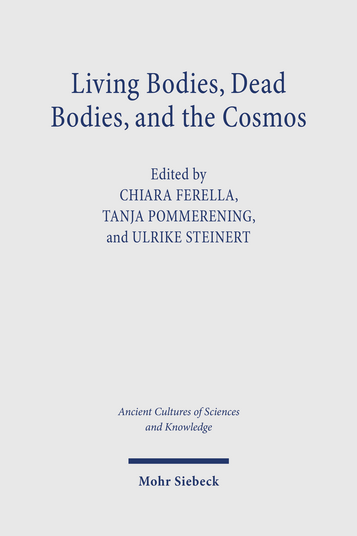Classics
Living Bodies, Dead Bodies, and the Cosmos
Culturally Specific and Universal Concepts
Edited by Chiara Ferella, Tanja Pommerening, Ulrike Steinert
[Lebendige Körper, tote Körper und der Kosmos. Kulturspezifische und universale Konzepte.]
approx. 115,00 €
including VAT
including VAT
paper
ISBN 978-3-16-160085-2
forthcoming
Also Available As:
Published in English.
This volume presents a collection of essays exploring transculturally and historically recurring conceptions of the human body and the natural world. Sixteen case studies from a range of disciplines, including psychology and history, delve into concepts related to the living body, the dead body, and the cosmos found in the cultural traditions of different eras and world regions, from ancient times to the present. The contributions highlight the mutual interrelations of human conceptions of the body and the cosmos; they explore the role of physically grounded experiences in shaping such concepts and investigate different factors contributing to the universality as well as the historical variability of these concepts.Survey of contents
PART I: Theoretical FrameworkChiara Ferella, Tanja Pommerening, and Ulrike Steinert 1. Introduction: The Embodied Mind of Premodern Cultures – Barbara Tversky 2. World in Mind, Mind in World: The View from Cognitive Science
PART II: Experiencing and Conceptualizing the Human Body
Simone Gerhards 3. Some Remarks on the Conceptualization of the Sleeping Body in Ancient Egypt – Rune Nyord 4. Bodies of Stone and Wood in Ancient Egypt – Shahrzad Irannejad and Aleksandar Milenković 5. Of Organs, Functions, and Body Concepts: Localization in Empedocles and Nemesius – Yudit Kornberg Greenberg 6. Eroticizing the Body and Nature: A Comparative Reading of Hindu and Jewish Sacred Texts – Reuven Kiperwasser 7. The Order(s) of the Universe and the (Dis)Order(s) of the Body – Han Nijdam 8. Schemas of the Body and Body Metaphors in Medieval Frisian Law
PART III: Conceptualizing the Dead Body and Coping with Physical Death
Rebekka Pabst and Oxana Polozhentseva 9. Dead Bodies: Conceptualizations of the Corpse from Ancient Egyptian and Medieval Perspectives – Fabian Neuwahl 10. »At Last Death Filled the Sanctuaries pf the Gods with Lifeless Bodies«: Dead Bodies in Roman Plague Descriptions – Adriana Gómez Aiza and Alondra Domínguez Ángeles 11. Self-Decapitation and Nahualism: Corporeal/Animistic Transposition in Mesoamerican Cosmovision – Annette Kehnel 12. The Powers of the Quasi-dead Body: A Footnote to Michael Tomasello's Concept of Shared Intentionality and the Benefits of Cooperation
PART IV: Conceptualizing and Interacting with the Cosmos and Its Phenomena
Laura Borghetti, Marie-Charlotte von Lehsten, and Katharina Zartner 13. Night, Wind, and Sun: Personification of Celestial Phenomena in the Ancient Near East, Ancient Greece, and Byzantium – Tom Hercules Davies 14. The World in Flux: Thinking through Cosmography in Greece, India, and Egypt – Daniel W. Graham 15. The Development of Greek Cosmology – Feray Coşkun 16. Heavens, World, and Human Beings in the Ottoman Cosmographies
Vorschautext
